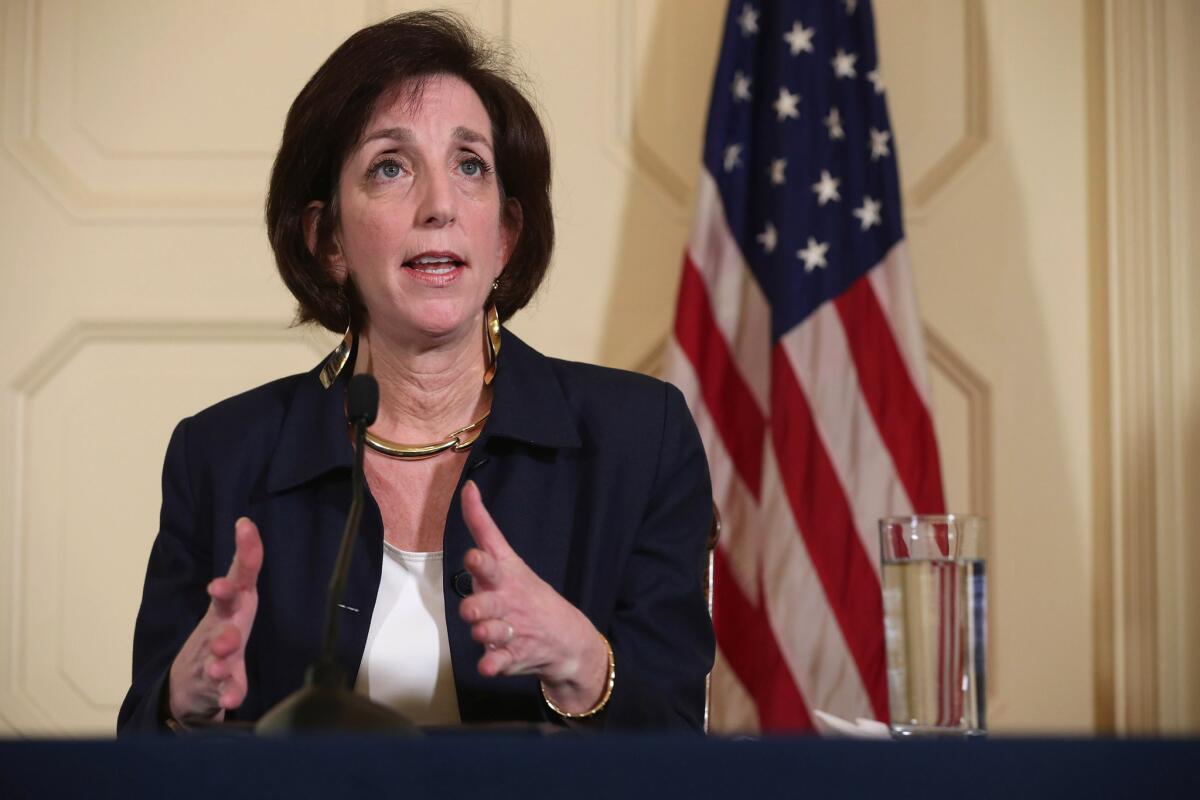Senate finally confirms new U.S. ambassador to Mexico

Roberta Jacobson, who has been assistant secretary of State for Western Hemispheric affairs, answers reporters’ questions in English and Spanish during a January news conference in Havana. She is the new U.S. ambassador to Mexico.
- Share via
Reporting from Washington — Ending a long standoff mired in presidential campaign politics, the Senate moved Thursday to confirm veteran diplomat Roberta Jacobson as U.S. ambassador to Mexico, filling a crucial diplomatic post that has been vacant for nine months.
Jacobson, assistant secretary of State for Western Hemispheric affairs, is expected to take up the position immediately in Mexico City.
Secretary of State John F. Kerry said the U.S. was sending “one of our finest diplomats to advance this important relationship.”
“I have long relied on Roberta’s wise counsel and good cheer, and I am confident that as ambassador, she will bring her extensive experience and judgment to this critical post,” Kerry said in a statement.
Mexico’s Foreign Ministry said in a statement that Jacobson’s confirmation “demonstrates the importance of a bilateral relationship which, given its maturity, transcends internal situations.”
“Ambassador Jacobson will give a new impetus to our bilateral relations and will contribute to consolidating a new institutional structure, lending more certainty and solidity to this relationship,” the statement said.
Sen. Marco Rubio of Florida, a former Republican presidential candidate, had blocked Jacobson’s nomination for months chiefly because of her role in the Obama administration’s push to restore diplomatic relations with Cuba.
But following negotiations this week, Rubio agreed to withdraw his hold.
The confirmation then sailed through the Senate as part of a procedural motion known as unanimous consent. No recorded roll-call vote takes place under such procedures.
Jacobson is widely respected in Mexico and in U.S. diplomatic circles because of her knowledge of Latin America, her fluency in Spanish and her deft handling of cross-border trade negotiations.
Mexico is the United States’ third-largest trading partner and is a crucial export market for California and other Southwestern states. It shares a 2,000-mile border with the U.S., whose officials seek its cooperation with drug interdiction and stopping illegal immigration.
In an interview with The Times late last year, Jacobson, 55, lamented leaving the ambassador’s post vacant at a time when Mexico seemed to be opening its potentially rich economy.
“There are huge opportunities for Americans” thanks to structural economic reforms in Mexico, especially in the energy and telecommunications industries, she said.
“The advocacy, support and visibility of a U.S. ambassador to help promote American businesses ... makes a difference,” Jacobson said.
Jacobson will take her post at a particularly difficult time in Mexico’s relationship with the world, however.
The government this week appeared to dismiss a damning report by independent investigators into the disappearance and likely massacre of 43 Mexican college students from the state of Guerrero in the fall of 2014.
The report found the government had been negligent and obstructionist in its own investigation. Some officials are believed to be responsible for the disappearances.
Jacobson’s supporters in the Senate had tried to bypass Rubio’s hold on her nomination. Sen. Jeff Flake (R-Ariz.) told his colleagues on Tuesday it was “incomprehensible” that such a vital diplomatic post remained vacant.
“The longer the United States goes without having an ambassador to Mexico, the more the relationship will suffer,” he said on the Senate floor when he tried, unsuccessfully, to push Jacobson’s confirmation through. “She enjoys overwhelming support. There is no reason not to move forward.”
Rubio rose to renew his objections, saying he had serious questions about some of Jacobson’s actions in the past.
The son of Cuban immigrants, Rubio has previously accused Jacobson and the White House of failing to ensure that Cuba improved human rights before restoring diplomatic ties, and of glossing over the Castro government’s penchant for stifling dissent. He also faulted U.S. policies in Mexico.
Jacobson was not the architect of the administration’s Cuba policy, but she was its most visible shepherd. After Obama announced his decision in December 2014 to renew diplomatic ties with Havana, she led talks with the government of President Raul Castro.
On Thursday, according to Senate sources, Rubio agreed to step aside after sanctions on another Latin American leftist country, Venezuela, were extended. The Senate Foreign Relations Committee earlier Thursday voted to extend sanctions that target specific Venezuelan officials accused of human rights abuses until 2019.
Obama nominated Jacobson to replace Ambassador Tony Wayne, who retired on July 15. She received approval from the Senate Foreign Relations Committee in November.
“Though long overdue, I’m pleased that the Senate has confirmed an individual as qualified and capable as Roberta Jacobson to serve as U.S. ambassador to Mexico,” Flake said Thursday night in a statement.
ALSO
Donald Trump and his supporters wonder how much being ‘presidential’ matters
Murder of acclaimed activist has U.S. questioning massive Central American aid package
More to Read
Sign up for Essential California
The most important California stories and recommendations in your inbox every morning.
You may occasionally receive promotional content from the Los Angeles Times.










